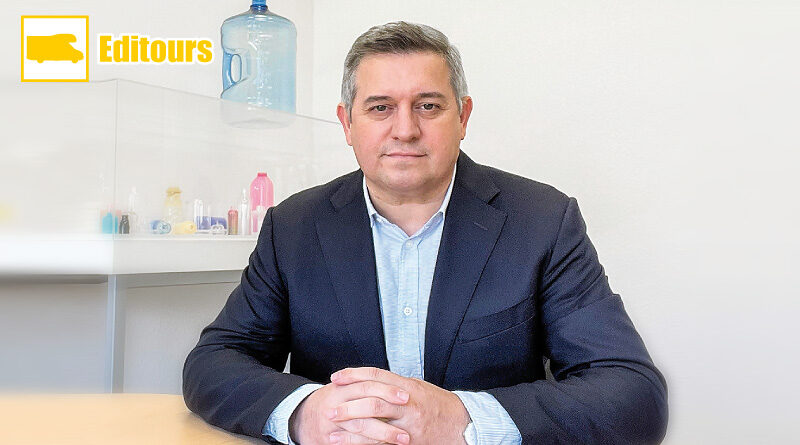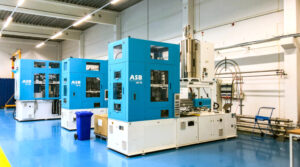Strong growth in cosmetics, health care and pharmaceutical products
Machine builder Nissei ASB during and post pandemic
March 25, 2022 – We met: Mr Karel Keersmaekers-Michiels, Managing Director
Karel Keersmaekers-Michiels explains: “At the start of the pandemic, there was an urgent demand for disinfectants and cleaning products which, of course, required the necessary packaging machinery and moulds. We had made major investments in new factories in India and Japan during 2018-2019 which enabled us to manage the sudden demand for this as well. The trend continued for more than a year. At the same time, demand for cosmetic products dropped significantly due to various lockdowns and travel restrictions. But then, the situation changed once again. Following the saturation of the market by disinfectant and cleaning products, demand again fell markedly while global easing of restrictions greatly boosted areas such as standard and high-priced cosmetics. By the way, we only had a temporary shutdown of our plant in India in the spring of 2020 but were fully operational again by the autumn”.
During the pandemic, Nissei ASB also continued to fine-tune its Zero Cooling technology, as well as processing quite a few orders for its high-performance PF36 machine used in the production of drinks bottles and launched in 2018. There were also developments in the area of environmentally-friendly packaging such as double-layer containers; lightweight, large-sized bag-in-box containers and lightweight reusable bottles. “On the manufacturing side we have optimised our global production system by enhancing our mould manufacturing capacity at our India plant and restructuring a flexible production system at the factories in Japan to respond to the increase in production and the spreading of risk. We will continue to invest for the future expansion aiming at increasing in-house production, shortening lead times and enhancing profitability”, explained Mr Keermaekers-Michiels.
This year, he is expecting a yield of JPY30 billion due to disruption in supply chains and a weakening global economy caused by rising material and energy prices. The war in Ukraine is also likely to have an adverse impact on Nissei ASB’s operations, particularly in Europe. “We will probably sell around 500 machines and systems this year”, said Keersmaekers-Michiels. The best-selling line is the 4-station ASB series which comes in three different sizes and on which a range of containers made from various plastics can be produced. The basic customer structure is around 35% from hygiene products and cosmetics, 25% food, 20% pharmaceuticals and 10% each from drinks to household cleaners.
But back to Europe. The market, Mr Keersmaekers-Michiels explains, is not only the most advanced in terms of plastic packaging but also a trend-setter in sustainability and contributes 20% to the company’s total sales. “In our strongest segment, cosmetics and personal care products, the design and functionality of the packaging plays an important role in both positioning and protecting the product as well as providing convenience to the consumer. Several global brands have their headquarters and R&D centres in Europe and their packaging developments have an impact on the rest of the world.”
The importance of sustainable production is also a constant issue with customers. Recyclate is already being processed on a broad scale, with future European legislation expected to further increase the demand for rPET for example. “Of course, rPET is not the same as virgin PET and there are technical challenges such as colour consistency, batch to batch consistency, IV stability, crystallinity level, etc.“, said Mr Keersmaekers-Michiels, “but the processibility on our machines has been sufficiently proven, given the large number of projects with rPET that we have already realised. Besides rPET we also offer processing of PET flakes and we continue to test newly developed materials such as biodegradables. Our machines have been proven to be very flexible when it comes to processing different plastic materials.“
In order to prepare itself for the future, Nissei ASB GmbH will continue to invest in staff development, communication and adaptability to enable the company to respond effectively to situations such as the pandemic with a high level of resilience. We also wanted to know how the market for single-stage technologies is likely to develop in the future, to which Mr Keersmaekers-Michiels replied as follows: “Single stage machines are extremely versatile and suitable for the production of high-quality containers and hygienic container production as the machines produce containers starting from the raw material. This also makes the production process energy efficient because cooling, reheating, handling and transport of preforms as in the 2-step system are eliminated. The trend towards short chains makes these small and medium output machines very suitable for local production to avoid expensive and polluting transport costs. I believe that we will see a further transition from mass production to small-scale local production in the coming years and the single step machine is a perfect match for this.”


